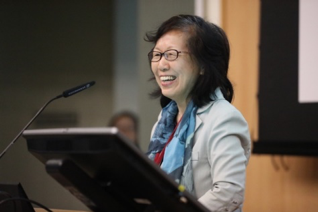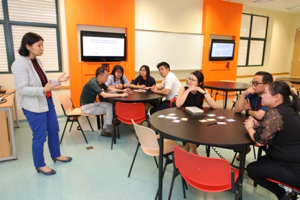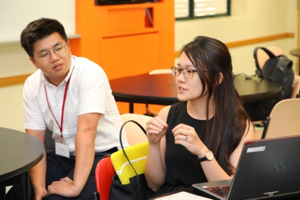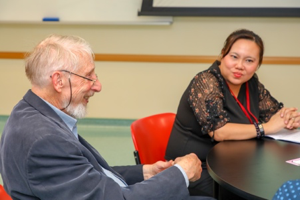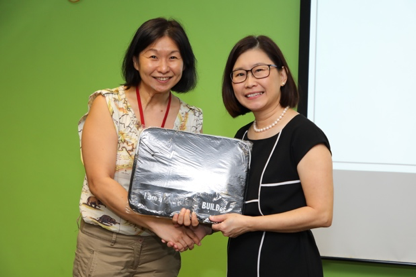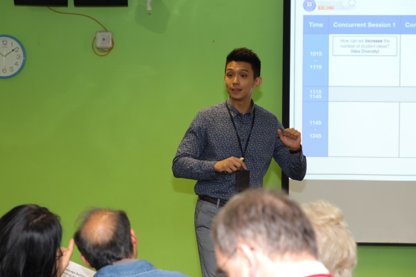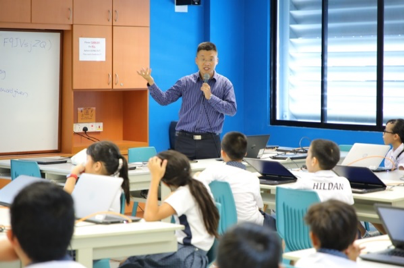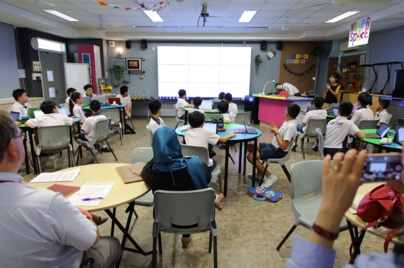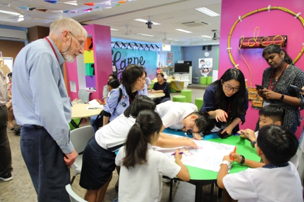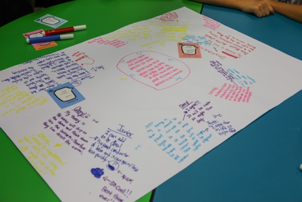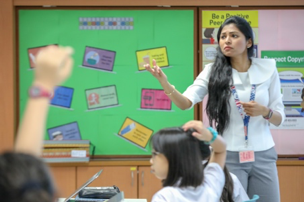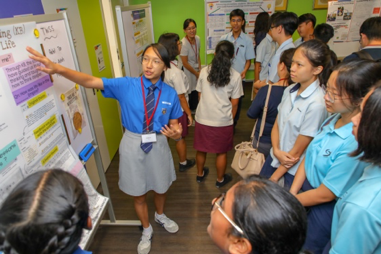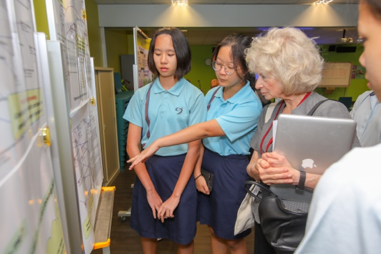Knowledge Building International Network Learning Session 12 - 13 March 2019
This year, the Office of Education Research and St Hilda’s Primary School (SHPS) co-hosted the Knowledge Building Network Learning (International) which was held from 12th – 13th March. The KB Network Learning is held in conjunction with the Knowledge Building Summer Institute (KBSI), an annual event for the international KB researchers and practitioners to extend the community and set a course for future developments. The KB community in Singapore is a hub of innovation among the international KB community. The focus of the KB community this year is what is closest to many teachers’ heart – ways to make our formative assessment truly transformative for our students.
The KB Network Learning event attracted participants from various institutions and schools, including international participants from China, Scotland, Japan, and Canada, to name a few. The participants constituted of KB teachers, school leaders, researchers, computer engineers, including the founders of the Knowledge Building theory, pedagogy, and technology, Professors Marlene Scardamalia and Carl Bereiter. The event witnessed the active engagement in sharing and discussing knowledge building practice between teachers, students, researchers, and professors from educational institutions and academic think-tanks.
Day 1’s programme aimed to enrich the participants on current developments of Knowledge Building research and to challenge them to think about research possibilities. Held at the National Institute of Education (NIE), the lectures by cognoscente in Knowledge Building pedagogy Professors Marlene Scardamalia and Carl Bereiter were opened to both NIE and Nanyang Technological University (NTU) colleagues. Professor Scardamalia delivered on Knowledge Building as a Way of Life, which focused on the ways in which the 12 frequently-cited Knowledge Building principles can be fully realised not just in formal education settings but also in quotidian settings. Professor Bereiter, the doyen of Knowledge Building, spoke on Present and Future Literacies, whose thesis centres on the relationship between literacy and communication of meaning. With the introduction of new, more diverse and media-sophisticated kinds of literacy, the shift from literacy as comprehension to literacy as coherence should be one of the goals of the 21st century.
From Left: Professor Marlene Scardamalia (University of Toronto); Professor Carl Bereiter (University of Toronto) and Professor Carol Chan (Hong Kong University).
The talk closed with two enriching responses by Professor Carol Chan and Mdm Constance Wong. Day one also saw participants having opportunities to discuss on the design and practice challenges of formative assessment and 21st century competencies. Grouped together in different tutorial rooms, participants shared ideas regarding their philosophies behind formative assessment and the challenges faced in the execution of these ideals in classrooms.
Concurrent discussion sessions for reflection at the end of Day 1.
Day 2’s programme opened up opportunities for professional sharing for both teachers and researchers. Held at St Hilda’s Primary School (SHPS), participants were invited to a variety of activities on KB including classroom visits, workshops, posters sessions facilitated by students as well as a plenary discussion. The Principal of SHPS, Mrs Daphne Yeoh, and Subject Head (Gifted Programme), Mr Andy Ng, gave a warm welcome to kickstart the event.
From Left: Dr Teo Chew Lee presenting token of appreciation to Mrs Daphne Yeoh (P, SHPS); Mr Andy Ng (Subject Head, SHPS) welcoming participants to the event.
The highlights of Day 2 were the open classroom visits and the students’ poster session. For the open classroom visits, participants had the opportunity to visit four classroom sessions which included a Grade 5 class on Chinese Language, Grade 6 on English Language and two Grade 5 classes on Science. The Chinese Language session featured student-led formative assessment of written expression in Chinese writing whereas the English Language sessions touched on formatively assessing understanding of a theme for narrative writing. The Science sessions showcased students’ application of Knowledge Building cards and language to enable formative assessment as well as formative assessment with a science application task on KF.
From Left: Classroom learning for Chinese Language (Grade 5); Classroom learning for English Language (Grade 6).
From Left: Participants observing Jamay’s Science class (Grade 5); Jamay’s students’ artefact using KB cards; Usha’s Science class (Grade 5).
Participants were particularly interested in Jamay’s Grade 5 Science class in which she used KB cards to teach the class. During the lesson, Jamay gave students a task to apply the concepts of evaporation and condensation to a real world context. She then posed two questions: 1) should a Dew Bank bottle be placed outdoors in the day or at night to collect more water? Students then proceeded to use KB cards to generate ideas and tried to figure out a more coherent explanations towards the problem. Participants engaged with students during their discussion while others watched the discussion unfold without intervention.
Participants were also invited to a lecture by Dr Erik Jahner (Research Fellow, OER) on neuroscience research in education settings and a workshop by Dr Aloysius Ong (Research Fellow, OER) on assessment based on KB principles and KF analytics. Dr Jahner’s lecture titled Growing Brains in Knowledge Gardens draws a parallel between neurology and ecology and analyses the way in which the knowledge building framework is consistent with an understanding of how our neurobiology engages with the world.
The second highlight for the participants was the poster session facilitated by students from several schools, including a poster on KB work from Taiwan classroom. Participants were able to hear students presenting in person their personal experience on KB learning and their reflection on knowledge gains and cognitive improvement from engaging in the Knowledge Forum. Students prepared posters for various subjects including English Literature, History, and Science.
From Left: Students finding out about their peers’ work during the poster session; Teachers and Researchers engaging with students during the posters session.
Each school dealt with different concerns regarding Knowledge Building pedagogies. Unity Secondary School presented on how the collaborative, inquiry-based Knowledge Building approach was used to transform their Literature class into a knowledge-creating community in which reflections and detailed assessments were incorporated into the lesson. Riverside Secondary was interested in deep constructivism by which students can come to a deeper understanding of a specific topic through interactive questioning, dialogue, and continual improvement of ideas by students for students. Ping Yi Secondary School’s presentation focused on how to develop a community of eager and proactive learners, as well as a positive and inclusive classroom culture. Teck Whye Secondary School built on the lectures from Day 1 on the idea of Knowledge Building as a way of life: their presentation centred on the discipline of history and the role of critical thinking. The presentations shared a common goal of sharing with the participants their reflections on and the results of KB pedagogies in their respective communities.
Day 2 programme closed with a lecture, a plenary session and round group discussions. Professor Hayashi Yusuke from Hiroshima University shared with participants on his current work using a concept mapping tool to support teachers in formative assessment. Participants also had an engaging and insightful plenary session led by Associate Professor Mark Baildon (Associate Dean, OER), Dr Teo Chew Lee (Senior Research Scientist, OER), and Dr Erik Jahner. The plenary session discussed recent work on and current understanding the roles of environment and assessment for deep disciplinary knowledge and 21st century competencies. For the final session, participants shared their understanding and viewpoints on 21st century competencies and markers of knowledge creation in round groups discussion. Student groups were also arranged as a platform to voice out their ideas on design improvements for Knowledge Building and assessment.
The Knowledge Building Network Learning (International) 2019 provided a productive space for engagement and exchange of ideas across institutions and networks. The two-day event brought together the international and local KB community and facilitated the expansion of current understanding of KB as a means of transformative assessment. The various activities planned in the program not only serve to interest new participants in the KB approach, but also to challenge all to advance KB practice and research and push frontiers for our education system. We thank our co-host, St. Hilda’s Primary School, for making this event a success, bringing productive knowledge gains to both the local and international KB community.



